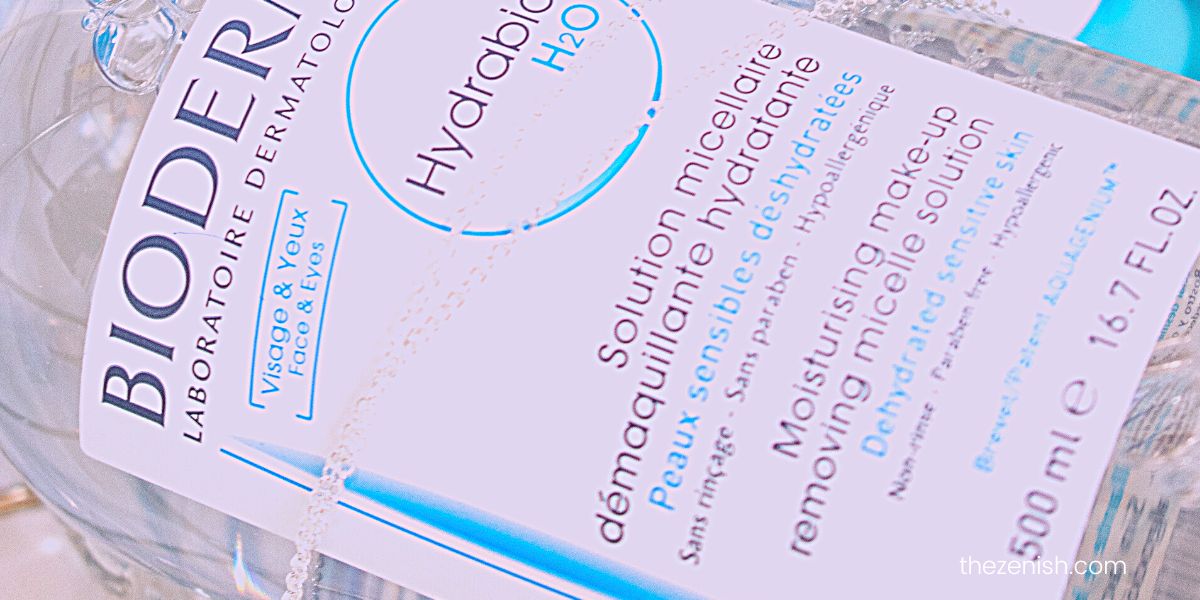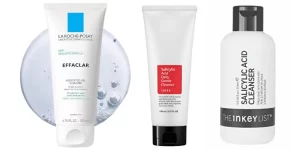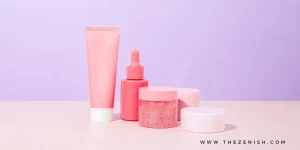
So, you’re probably a little familiar with micellar water.
The liquid that promises to gently remove your makeup, sweat, oil etc all without rinsing and without stripping your skin of its natural oils.
This also makes it a convenient option if you’re on the go or without access to water.
It’s been touted as a game-changer in the beauty world – a gentle yet effective cleanser that’s perfect for all skin types.
Some people swear by micellar water, while others claim that it caused them to break out.

So, what’s the truth? Can micellar water cause acne?
Let’s start with the basics.
What exactly is micellar water?
Simply put, it’s a gentle cleansing solution made up of purified water, moisturizers, and mild surfactants that promises to remove your makeup, dirt, and oil from your skin without the need for harsh scrubbing.
It’s like a gentle, magical solution that whisks away impurities without stripping your skin barrier of its natural oils.
See also: 6 Tips to help you maintain a healthy skin barrier
Well, the ingredients can vary depending on the brand, but most micellar water contains tiny balls of cleansing oil called micelles.
These micelles are suspended in water, which creates a cleansing liquid. Some micellar waters also contain other ingredients like glycerin, which can help hydrate your skin.
But how does it actually work?
How does micellar water work?
When you apply micellar water to your skin, the micelles attract and trap dirt, oil, and makeup, effectively pulling them away from your skin.
And because micellar water doesn’t require any harsh rubbing or rinsing, it’s incredibly gentle on your skin.
So now, onto the million-dollar question
Can micellar water cause acne?
While there’s no clear-cut answer, some studies have suggested that it may be a contributing factor for some people.
So, what are the potential reasons that micellar water could cause acne?
#1: The oils are causing you to breakout
Well, one theory is that the oil in micellar water could be clogging pores. Even though micellar water is marketed as a gentle cleanser, it still contains oils that can leave a residue on your skin.
If this residue isn’t washed away, it can mix with your dead skin cells, sweat, makeup etc, leading to clogged pores and ultimately, acne.
See also: Can acne-prone skin use oils?
#2: Surfactants disrupting your skin barrier
Another possible reason is that some micellar waters contain surfactants, which can disrupt the natural pH balance of your skin.
This can lead to inflammation and irritation, both of which can contribute to acne.
#3: Common micellar ingredients
One of the reasons that micellar water can cause acne is due to its ingredients. While micellar water is generally considered to be gentle and suitable for all skin types, some of the ingredients can be problematic if your skin is acne-prone.
One culprit is polyethylene glycols (PEGs), which are used as emulsifiers in micellar water. PEGs can clog pores and contribute to acne, especially if you have sensitive skin.
Another potential contributor is fragrance, as it can irritate your skin and cause inflammation, leading to breakouts.
Other problematic ingredients to watch out for include alcohol, which can be drying and irritating to the skin, and preservatives such as parabens, which can also be irritating and may cause an allergic reaction in some people.
See also: 16 Best paraben free moisturizers for your face (2023)
Knowing which ingredients to avoid can be helpful in choosing micellar water that won’t cause breakouts.
Some micellar waters are formulated specifically for acne-prone skin, which is a good option if you’re prone to breakouts.
It’s always a good idea to read the ingredients list carefully and do a patch test before using a new product to see how your skin reacts.,
#4: Possible sensitivity
And finally, it’s possible that you have a sensitivity to one or more of the ingredients in micellar water.
While it’s generally considered to be a gentle and non-irritating cleanser, everyone’s skin is different, and you may find that your skin reacts negatively to certain ingredients.
So If you find that you’re breaking out after using your micellar water, it’s worth checking the ingredients list to see if there’s anything on the ingredients list that could be causing the problem.
Overall, the most important thing is to listen to your skin and do what works best for you. Whether you choose to use micellar water or use another cleansing option, prioritize products and habits that keep your skin healthy and happy.
Of course, while micellar water may be a contributing factor for some people, there are other factors that can also cause acne.
Is there a link between micellar water and acne?
While there’s no definitive answer, some studies have suggested that it might be a culprit for some people.
One study found that some surfactants commonly found in micellar water can disrupt the natural balance of your skin, leading to inflammation and ultimately, acne.
The oils in micellar water can leave a residue on your skin, which can mix with dead skin cells and other impurities to clog your pores.
Now, it’s important to note that these studies are just a small piece of the puzzle. They don’t necessarily mean that micellar water is bad for your skin or that it will cause acne for everyone.
But they do suggest that it’s possible that micellar water could be a contributing factor for some people.
So, if you’ve been using micellar water and have been experiencing acne, it may be worth considering whether it could be a culprit.
Of course, it’s always best to consult with a dermatologist to get a professional opinion on what might be causing your acne.
But don’t fret – there are plenty of other gentle and effective cleansers out there that you can try if you find that micellar water isn’t working for you.
Ultimately, it’s all about finding what works best for your skin and sticking with it.
Other factors that can contribute to acne while using micellar water
We’ve talked about some of the reasons why micellar water could cause acne, now let’s take a look at some factors that might increase the risk of this happening.
#1: Your skin is acne-prone
If you have oily or acne-prone skin, you may be more likely to develop acne from using micellar water.
This is because your skin is already producing excess oil, and adding more oil from the micellar water could exacerbate the problem.
See also: How to know if you have acne-prone skin: 9 skin care tips from dermatologists
#2: Not rinsing it off
Another factor to consider is whether you’re properly removing the micellar water from your skin.
If you’re not rinsing thoroughly or using a clean washcloth or cotton pad to remove the residue, you could be leaving behind a film on your skin that can lead to clogged pores.
#3: Mixing with incompatible products
It’s also worth noting that if you’re using other skincare products that contain harsh ingredients, this could increase the risk of developing acne from micellar water.
#4: It’s not getting your face clean
Similarly, if you’re not properly removing your makeup before using micellar water, you could be trapping makeup, sweat and oil under the micellar water, which can lead to clogged pores and breakouts.
#5: Other factors
If you’re using other skincare products with harsh ingredients or you regularly spend days without removing your makeup, that could also be causing acne.
And finally, stress, hormones, and diet can all play a role in the development of acne.
While these factors aren’t directly related to micellar water, they could be contributing to the problem and making you more susceptible to developing acne from any skincare product, including micellar water.
So, if you’re using micellar water and experiencing acne, it’s worth taking a closer look at these to see if any of them could be contributing to the problem.
How to use micellar water without causing acne
Choose the right micellar water
Not all micellar waters are created equal. When choosing micellar water, look for one that’s gentle and non-comedogenic, which means that it won’t clog your pores and lead to acne.
Avoid micellar waters that contain alcohol or fragrance, as these can irritate your skin and cause breakouts.
Use micellar water as part of your skincare routine
Micellar water isn’t a replacement for a full skincare routine. It should be used as a first step to help remove your makeup etc before washing with a gentle cleanser, followed by a moisturizer.
This will help to ensure that your skin is thoroughly cleansed and hydrated, which can help prevent acne.
Rinse your face after using micellar water
While micellar water is designed to be a no-rinse formula, it’s important to rinse your face after using it.
This will help to remove any residual micellar water and impurities from your skin. If you leave micellar water on your skin, it can lead to irritation and breakouts.
To rinse your face, simply splash your skin with water or use a damp washcloth.
All in all, micellar water is a good choice to add to your skincare routine. By choosing the right product, incorporating it into your full skincare routine, and rinsing your face after use, you can help prevent acne and keep your skin looking its best.
If you’re a fan of micellar water and you want to continue using it without experiencing acne, there are some tips you can follow to use it safely.
Tips for using micellar water
- First off, make sure you’re using high-quality micellar water that’s free of harsh ingredients.
- Look for micellar waters that are formulated for sensitive skin and avoid any products that contain alcohol, fragrances, or other potential irritants.
- When using micellar water, it’s important to use a clean washcloth or cotton pad to remove the residue from your skin.
- Make sure you’re using gentle, circular motions and avoid rubbing too hard, as this can irritate your skin and lead to inflammation and breakouts.
- It’s also a good idea to rinse your skin with water after using micellar water, especially if you’re using it to remove makeup or other impurities. This will help ensure that any residue is completely removed from your skin and won’t mix with other impurities to clog your pores.
Of course, there are some situations where you might want to avoid using micellar water altogether.
| this post may contain affiliate links, which means if you purchase from one of these links, I may receive a small commission at no additional cost to you. |
7 micellar waters for acne-prone skin
Bioderma Sensibio H2O Micellar Water
This cult-favourite micellar water is perfect for sensitive and acne-prone skin. It gently removes makeup and impurities without irritating the skin.
La Roche-Posay Effaclar Micellar Water
Specifically formulated for oily and acne-prone skin, this micellar water effectively removes excess oil and dirt without stripping the skin of its natural moisture.
Vichy Pureté Thermale Micellar Water
This micellar water is enriched with vitamin E and is gentle enough for even the most sensitive skin. It effectively removes makeup and impurities while leaving the skin feeling fresh and clean.
Avène Micellar Lotion Cleanser and Makeup Remover
This micellar water is formulated with natural ingredients like Avène Thermal Spring Water and chamomile to soothe and calm irritated skin. It’s perfect for those with sensitive and acne-prone skin.
Garnier SkinActive Micellar Cleansing Water
This affordable micellar water is a great option for those on a budget. It effectively removes makeup and impurities while being gentle on the skin.
Dermalogica PreCleanse Balm
While not a traditional micellar water, this balm-to-oil cleanser is a great option for acne-prone skin. It effectively removes makeup and impurities while nourishing and hydrating the skin.
Estée Lauder Take It Away Makeup Remover
This gentle micellar water is perfect for those with acne-prone skin. It effectively removes makeup and impurities while leaving the skin feeling fresh and clean.
Don’t be afraid to experiment with different options and consult with a dermatologist if you’re experiencing persistent or severe acne.
When to avoid micellar water
If you have particularly sensitive skin or you’re experiencing acne flare-ups it might be best to stick with a gentle cleanser or another cleansing option until your skin calms down.
However, if you do want to incorporate micellar water into your skincare routine, then use it in moderation.
Try using it once a day, either in the morning or evening and see how your skin reacts. If you notice any irritation or breakouts, it might be best to switch to a different cleansing option.
Ultimately, the key to using micellar water is to listen to your skin and be mindful of how it reacts to and with different products.
With a little bit of experimentation and careful attention to your skin’s needs, you can continue using micellar water as part of a healthy skincare routine.
Alternatives to micellar water
If you find that micellar water just isn’t working for your skin, it may be time to explore alternatives to achieve clear skin.
One option is to switch to a gentle, fragrance-free cleanser that doesn’t require a cotton pad or any rubbing or pulling of your skin.
Look for a cleanser that contains skin-soothing ingredients like aloe vera or chamomile to help calm irritated skin.
Another alternative to micellar water is to use an oil-based cleanser. Oil-based cleansers can effectively remove makeup and sunscreen without stripping your skin of its natural oils.
However, oil cleansers can contribute to acne and make flare-ups worse, so use them with caution.
Whatever cleansing method you choose, make sure to follow up with a moisturizer to keep your skin hydrated and healthy.
Final thoughts
The debate over whether micellar water causes acne is ongoing. While some studies suggest that micellar water can clog pores and contribute to acne, others argue that when used correctly, it can be a gentle and effective way to cleanse your skin.
If you’re concerned about the potential link between micellar water and acne, there are plenty of alternatives to consider.
Gentle cleansers, gel cleansers, foam cleansers and other cleansing options can provide a more thorough cleanse without the potential drawbacks of micellar water.
Ultimately, the key to using micellar water safely is to choose a high-quality product, use it correctly, and pay attention to how your skin responds.
If you do decide to use micellar water, make sure to follow the tips above for safe use, and consider incorporating other cleansing options into your routine for a more thorough cleanse.
And as always, if you’re experiencing persistent or severe acne, it’s best to consult a dermatologist for personalized advice and treatment options.



